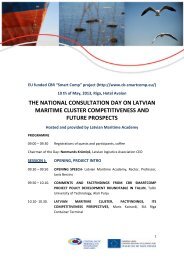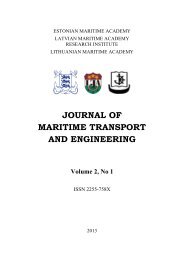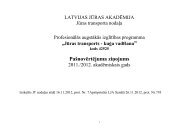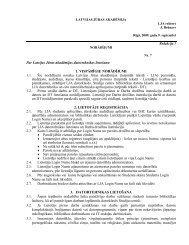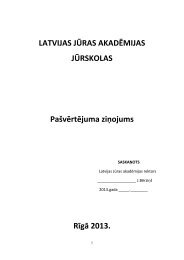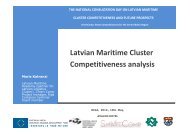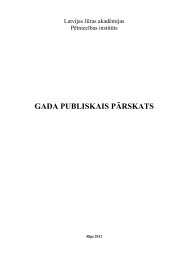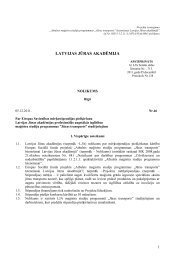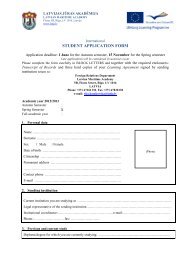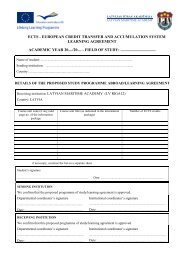14. starptautiskÄ konference 2012 - Latvijas JÅ«ras akadÄmija
14. starptautiskÄ konference 2012 - Latvijas JÅ«ras akadÄmija
14. starptautiskÄ konference 2012 - Latvijas JÅ«ras akadÄmija
You also want an ePaper? Increase the reach of your titles
YUMPU automatically turns print PDFs into web optimized ePapers that Google loves.
Proceedings of 14th International conference „Maritime Transport and Infrastructure - <strong>2012</strong>”days after the Norman Conquest learned the French language and used French expressions becauseFrench was the language of the new rulers of the country. The prestige factor leads to extensiveborrowing from the dominant language into the lower language. Another motive for borrowing is theneed filling motive. New experiences, new objects and practices bring new words into the language.Tea, coffee, tobacco, sugar, cocoa, chocolate have spread all over the world, along with the objectthese words refer to. Typhoons and tsunamis have not, but direct or indirect experience connected withthem has.The spread of Christianity into England in the 7 th century carried many Latin words into OldEnglish as cultural loanwords: abbot, pope, cap, sock, etc.Once a borrowed word has come into widespread use, its subsequent history is like that of anyother form in the language. During the period of importation, the shape of the word is subject toadaptation and variation because different borrowers imitate the word in slightly different ways.In the course of history English has come in close contact with many languages, mainly Latin,French and Old Norse (or Scandinavian). However, in spite of Latin, Celtic and Scandinavianinfluence, the general character and vocabulary of Old English in the middle of the eleventh centurywas essentially that what it had been five centuries before, but in 1066 came the Norman conquest, anevent which had more influence on the English language that any other from outside.3. The Effect of Borrowing on the English LanguageIf we base our conclusions on the study of the forms recorded in dictionaries, it is very easy tooverestimate the effect of foreign words. The actual number of native words is extremely smallcompared with the number of foreign borrowings recorded. On the other hand, if we examine spokenEnglish in familiar conversation, we find the proportion reversed. It has been estimated that less thanfifty words, all of them native words, suffice for more than half our needs [3]. The proportion of nativewords to foreign words will naturally vary with the subject matter and any article on scientificknowledge would naturally contain a high percentage of borrowings.Since the general opinion is that English has on the whole benefitted from the adoption of somany foreign words the obvious advantage is the wealth of synonyms which have been created by theadoption of a foreign word.When in two languages we find no trace of the exchange of loanwords one way of the other,we are safe to conclude that these two nations have had nothing to do with each other. But if they havebeen in contact, the number of loan words will inform us of their reciprocal relations, the influencethey have had on each other and in what domains of human activity each has been superior to theother. The study of language proves the fact that when one nation produces something that itsneighbours think worthy of imitation they will take over not only the thing, but also the name. Loanwords are nearly always technical words belonging to one special branch of knowledge or industry,and may be grouped so as to show what each nation has learnt from the other [4].4. The Influence of Latin on EnglishLatin has since the earliest period of the history of English been one of the principal donorlanguages in the expansion of the English vocabulary. A great many of the lexical items which canultimately be traced back to Latin have entered the English language indirectly via French and variousother Romance languages, which together with Latin probably contributed almost two thirds of theword stock of present day English. All through the Middle Ages Latin played an important role as anofficial written language in England. A substantial part of Latin and Greek loans which have survivedto the present day were first introduced as particular terms in science e.g. theory (Gr), praxis (Gr),system (Gr), method (Gr), atmosphere (Gr),radius (L), formula (L), calculus (L), notion (L),concept(L), satellite(L), exist(L), etc. Sometimes quite a number of English words come from just oneLatin root. For example, the Latin word vocare, vocatus vocare - to call; vocatus – called - hasproduced a whole range of words in English vocabulary e.g. provoke, provocative, evoke, evocative,109



